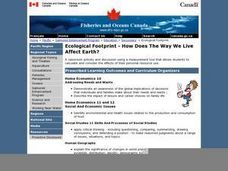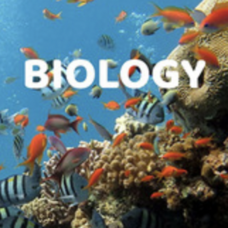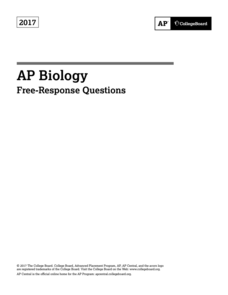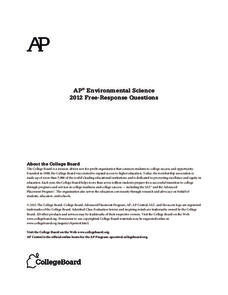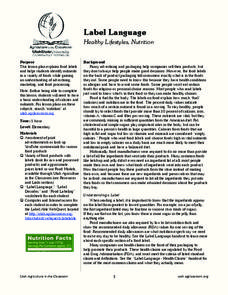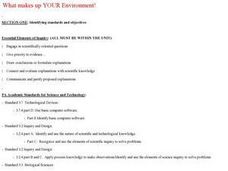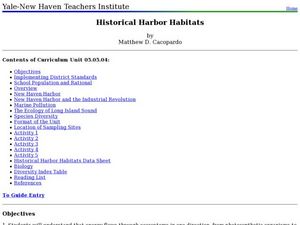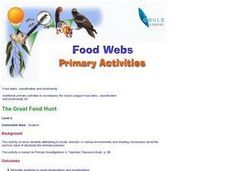Science Matters
Crawly Composters
Get your hands dirty with an interactive lesson that showcases the process of decomposing and returning nutrients back into the soil. After building a compost pile, pupils regularly observe the ways worms help with changes to the soil...
Learning Games Lab
Gram Staining
Scholars use a lab simulation to test contaminated yogurt for bacteria by gram staining. They learn proper lab procedures for handling bacteria and for sterilizing equipment, and then walk through the process on their own to try gram...
Curated OER
Family Traditions, Customs and Beliefs
Students discuss African childhood, explore family traditions, customs, and beliefs, examine African recipes, discuss differences or similarities in food preparation between the U.S. and Africa, and prepare a dish with adult supervision.
Curated OER
Ecological Footprint--How Does The Way We Live Affect Earth?
Students demonstrate an awareness of the global implications of decisions that individuals and families make about their needs and wants. They identify environmental and health issues related to the production and consumption of food....
Teach Engineering
The Great Pacific Garbage Patch
The Great Pacific Garbage Patch is one of several garbage patches around the world where garbage accumulates naturally. As part of a GIS unit that combines oceanography, environmental science, and life science, class members investigate...
Utah Education Network (UEN)
Utah Open Textbook: Biology
Curriculum resources can be expensive—but not this one. An online textbook offers informational text for a complete high school Biology course. Topics include energy flow, body system, genetics, and evolution.
American Museum of Natural History
Dive Into Worlds Within the Sea
The ocean is a series of ecosystems within an ecosystem. Learners dive into an exploration of ecosystems in an interactive lesson. They identify connections between organisms by following leading prompts within the lesson. The resource...
National Wildlife Federation
Soil Decomposers
Worms are the kings of the decomposers. A four-part lesson has learners experiment with the characteristics of earthworms and their sensitivities. They vary factors such as light, acidity, temperature, and touch of soil and observe the...
University of Southern California
How do Organisms Interact?
Examine how organisms interact through a hands-on experience. Learners study population dynamics and distribution during an informative five-lesson unit. The focus is on the ocean environment and the organisms within it.
College Board
2018 AP® Environmental Science Free-Response Questions
Less than nine percent of all AP Environmental Science test takers scored a perfect five on the exam in 2018. Learn from the best answers as well as the common mistakes thanks to the College Board. Four questions from the test covering...
College Board
2017 AP® Biology Free-Response Questions
With AP Biology remaining the most popular AP science exam, many teachers need help preparing. The College Board offers the actual free-response questions from the 2017 test covering pollination, germination, and more. Scholars learn the...
College Board
2012 AP® Environmental Science Free-Response Questions
Sometimes solving one problem leads to another. Scholars respond to questions about fracking to harvest natural gas and other environmental related topics. The resource provides items released from the 2012 AP® Environmental Science exam...
College Board
2001 AP® Environmental Science Free-Response Questions
Water quality testing often reveals interesting facts about the local environment. Scholars respond to several AP® questions highlighting topics such as air pollution, water pollution, and the spread of disease. Each question requires a...
Curated OER
Label Language
Students read food labels and understand their meaning. In this healthy eating lesson, students discuss healthy foods and snacks. Students understand the fat and calorie content of foods and discuss the regulations on food manufacturers....
Curated OER
Eating Out
In this eating out instructional activity, students practice matching ten food items on the right to their appropriate pictures on the left.
Curated OER
Graphic Organizer Collection: Character
In this collection of graphic organizers for a literature unit, students will complete 22 different graphic organizers on the topic of character development. For example, this collection includes character analysis and various attribute...
Curated OER
What makes up YOUR Environment!
Young scholars create their own land or water environment. They make their environment livable for all the different animals they collect to put in it. Students research the types of animals that they can have in their environment, and...
Curated OER
Ecosystem Interdependence
Students outline a scenario demonstrating ecosystem interdependence. They explain the effects of this change according to the food web. They give a positive example such as increased rain and have the students call out answers to your...
Curated OER
Historical Harbor Habitats
Tenth graders create food web displays in the classroom. In this ecology lesson, 10th graders identify the different pollutants in the environment and their effect on organisms. They collect samples of sediments from the harbor and...
Curated OER
Salt Marshes - Biotic Perspectives
The vocabulary used in this presentation on salt marshes makes it most appropriate for high school or college level ecology classes. The content, however, is relatively simple; It introduces the flora and fauna of this type of ecosystem....
Curated OER
The Great Food Hunt
Students locate 'animals' in various environments and draw conclusions about the survival value of structures the animals possess. They create model macaroni animals and hide them and other teams of students find them and evaluate the...
Curated OER
Genetically Modified Foods
Students investigate the risks of genetically modified organisms. They examine web site that contain information about GMO's and share the information with other adults.
Curated OER
Understanding Our Planet's Food Web
Sixth graders, in groups, examine how humans have a tenuous position as part of an ecosystem.
Curated OER
Ecology
Fourth graders research an ecosystem and its endangered species. They create a PowerPoint Presentation, oral report, poster or a booklet based on their research. They research on the internet and in biology texts in teams of 4.





